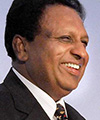Education must be Up to Date
THIRUVANANTHAPURAM: A veteran diplomat with 37 illustrious years in the Indian Foreign Service (IFS), TP Sreenivasan is now at the helm of The Kerala State Higher Education Council (KSHEC) as its Executive Vice-Chairman. He has held various portfolios in India and abroad. With nearly 20 years of experience in multilateral diplomacy, he has represented India at a number of international conferences organised by the United Nations, the Commonwealth and the Non-Aligned Movement.
Sreenivasan has chaired several UN committees and conferences. He is from the IFS batch of 1967 and retired in 2004. Sreenivasan foresees the higher education sector in Kerala undergo a sea change in the next 10 years from the state of affairs in over a century.
Catching up with the best
Taking a cue from world-class universities, efforts must be to create similar quality universities, says Sreenivasan. He adds that we have more or less achieved the primary purpose to make education accessible to everyone. “We have to keep up with what is happening in the rest of the world, as education cannot be left behind. People in Kerala have to seek jobs not only in Kerala, but in other Indian states and abroad. So we have to catch up with the trends in education all across the globe,” he explains. He, in fact, says that 10 years is not enough for introducing reforms like changing syllabus, training programmes and making better use of technology.
Better utilisation of technology
Sreenivasan points out the need to make use of available technological advancements. Utilisation of Massive Open Online Courses (MOOC), TED talks and Flip schools which are available free of cost are some of his suggestions. He opines that through MOOCS, people can learn from the world’s best teachers and professors and get a degree from any university they want. TED talks offer a plethora of subjects students can listen to.
In Flip schools, students can flip homework to the class and class work home. At their own convenience, they can listen to the lectures recorded on mobile phones and use the time in classrooms to ask questions and get their doubts cleared, he says.
He feels that teachers now must learn more, and the present method of providing students what they already know will not suffice. They must use technology beyond emails and social networking. Above all, it is the mindsets that need to change, according to the former IFS officer.
KSHEC’s bit for improvement
The objective of the Council is to advise the government, universities and colleges on how to improve their quality and teaching methods. It does not leave the recommendations half way, but follows them up with the government from time to time. It has identified six areas that require special attention: Infrastructure, teacher training, use of technology, research, autonomy and internationalisation. The Council makes action-oriented reports chaired by experts that are submitted to the government, and put into practice after seeking approval.
Four reports have already been approved by the government. The report on Choice Based Credit and Semester System is being implemented by the universities now. Focus now is on revamping the semester system. Based on the report on Autonomous Colleges in Kerala, the government has identified 13 colleges that can be conferred autonomous status.
The report on Kerala State Faculty Academy on teacher training got approval and was sanctioned government funds. If the report on Kerala State Assessment and Accreditation Council is approved, Kerala will be the first state in India to have a State Accreditation Council other than the National Assessment and Accreditation Council, the nationally recognised accrediting agency funded by the government.
The reports submitted are the Kerala State Higher Education Policy, which he calls “a menu card of reforms”, with recommendations that government can pick from at any time and a report on industry-academia Linkages, suggests strengthening links between industry and educational institutions. Another report on administrative staff suggests giving better facilities and service conditions to non-teaching staff in colleges. The Council has also prepared an interim report on Arabic Colleges that recommends formation of Arabic Universities.
It has committees that undertake various studies like an International Relations Group to foster international cooperation with foreign Universities, review of universities acts, use of information technology in colleges, foreign travel of teachers, Arabic colleges (aims at resource sharing between colleges), Rashtriya Ucchatar Shiksha Abhiyan and on setting up a National University for Internal Security and Police Sciences.
The committee also conducts monthly public lectures, offers scholarships for undergraduate and postgraduate students in arts and science has published a journal Higher Education for the Future and conducts district students seminars and principals’ conferences.
The present council has just over a year left in its tenure of four years. “What we have done may be half of what we set out to do, and the remaining half is to be done by the time we leave. These efforts must continue. Education reform is a must and there is no time to lose,” he says.
